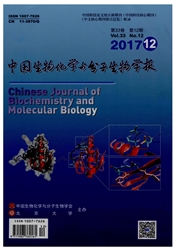

 中文摘要:
中文摘要:
分子伴侣能够与其他蛋白质的不稳定构象相结合并使其稳定.它的功能之一是能够帮助蛋白质进行正确的折叠与组装.最新研究发现,在肠道致病菌的周质空间中存在着酸性条件下能帮助周质蛋白复性的分子伴侣HdeA和HdeB.HdeA在极端酸性的胃部环境中由二聚体迅速解离成具有伴侣活性的单体,HdeA单体能够和变性的底物蛋白结合防止它们酸诱导聚集,从而保护肠道致病茵安全到达肠道.本文对肠道致病菌的耐酸机制进行了总结,最后对HdeA和HdeB作用机制的研究近况进行综述,最后对HdeA和HdeB以后的研究方向进行了展望.
 英文摘要:
英文摘要:
The molecular chaperones can combine with the unstable proteins and eventually make them stable. One of their functions is that all the molecular chaperones are able to help the proteins to correct folding and assembly. Recent studies have uncovered that two periplasmic chaperones HdeA and HdeB can help proteins to refold and protect the enteric bacteria in acidic environment. HdeA is known to undergo an acid-induced dimer to monomer transition and functions under extremely acidic environment of the mammalian stomach as a disordered monomer which is able to bind a broad range of proteins to prevent their acid-induced aggregation. In this paper, we review recent advances in the understanding of the acid resistance mechanism of Gram-negative enteric bacteria and focus on the mechanisms of HdeA and HdeB in preventing acid-induced protein aggregation and facilitating protein refolding following pH neutralization. Finally we propose the future research directions of HdeA and HdeB.
 同期刊论文项目
同期刊论文项目
 同项目期刊论文
同项目期刊论文
 期刊信息
期刊信息
